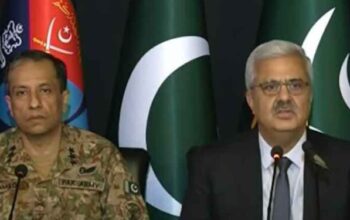By Staff Reporter
GARI KHUDA BAKHSH: Bilawal Bhutto Zardari, chairman of the Pakistan Peoples Party (PPP) and a key government ally, demanded Prime Minister Shehbaz Sharif on Friday abandon plans to build six canals on the Indus River, warning the project threatens national unity and risks inflaming inter-provincial water disputes.
The Bhutto-Zardari scion at an addressed in Gari Khuda Bakhsh to mark the 46th death anniversary of former Prime Minister Zulfikar Ali Bhutto, said his party will stand with the people against the government if the contentious canals project plan proceeds.
“Prime Minister Shehbaz Sharif, this is the demand of the people, not just ours. If we are to stay united as brothers, the project must be withdrawn,” he told supporters in the party’s stronghold. “If the people reject these canals, we stand with them, not the government.”
The government intends to construct six canals on the Indus River to irrigate the Cholistan desert, a project estimated at Rs211.4 billion. It asserts the project will convert 400,000 barren acres into farmland to address food security.
However, Sindh-based parties and civil society groups accuse Islamabad of redirecting water from the Indus—Sindh’s primary water source—to benefit Punjab, Pakistan’s most populous province.
The PPP, a key coalition partner in the fragile government of Pakistan Muslim League-Nawaz led Sharif, has consistently opposed the plan.
Last month, President Asif Ali Zardari, Bhutto-Zardari’s father, warned that unilateral federal decisions risked “grave strain” on Pakistan’s federation at his address to both the houses of parliament.
Bhutto-Zardari said his party would not allow any “irresponsible decision” on water distribution and would resist any attempt to divide the country through controversial projects.
“The PPP formally rejected the canals in a January Central Executive Committee meeting. We are unhappy with the government over the canals project, which is why we are not part of it,” he added.
Bhutto-Zardari highlighted his party’s history of challenging contentious water projects, including efforts by his mother, late Prime Minister Benazir Bhutto, to block a dam in the 1990s. “Who stopped that dam? It was Shaheed Benazir Bhutto,” he added.
The PPP leader also took aim at political rivals, including jailed ex-PM Imran Khan, founder of the opposition Pakistan Tehreek-e-Insaf (PTI), for delayed opposition. “When prisoner number 804 initiated canals, only PPP resisted,” he said, alluding to Khan’s inmate designation. “We rejected this project before, and we will continue to reject it.”
“They want to break the Indus River to divide us, but we will not let that happen,” he said, adding that nationalist groups had united against the project, calling for the government to let the Indus flow freely.
Bilawal urged the federal government to listen to the people of Sindh and Punjab regarding fair water distribution. “We are the ones who always said ‘Pakistan Khappay’, but fairness in water distribution is non-negotiable,” he stated.
The canals plan has fueled protests across Sindh, with critics accusing the government of attempting to divide the Indus River and sow regional discord. “They want to break the Indus River to divide us, but we will not let that happen,” Bhutto-Zardari declared, echoing nationalist groups’ calls to let the river flow freely.
The PPP chairman urged the Sharif’s government to heed the concerns of Sindh and Punjab residents. “We are the ones who always said ‘Pakistan Khappay’ (Pakistan should remain united), but fairness in water distribution is non-negotiable.”
He warned that the PPP would resist any “irresponsible decision” on water allocation, adding, “The workers of the PPP have grown old fighting for the fair distribution of water. … Be it Musharraf’s unilateral canal proposal, or that of the PTI founder, there is no forum where we have not taken up our struggle.”
The dispute reflects long-standing interprovincial conflicts over water allocation under Pakistan’s 1991 Water Apportionment Accord. Sindh nationalists allege Punjab dominates resource distribution, a charge Punjab denies.
Copyright © 2021 Independent Pakistan | All rights reserved




